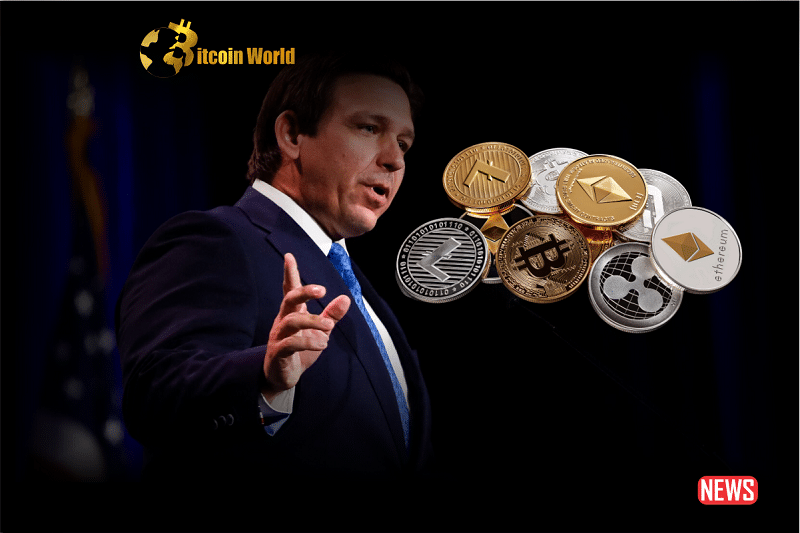The 2024 presidential race is heating up, and with it, the conversation around cryptocurrencies is taking center stage. Florida Governor Ron DeSantis is making a significant push with a platform centered on “economic independence,” and a key component of this is his strong stance on digital currencies. If you’re invested in crypto or simply curious about its future in the US, DeSantis’ promises are worth paying attention to.
What’s DeSantis Saying About Crypto?
At a recent campaign event in New Hampshire, DeSantis didn’t mince words. He pledged that if he wins the presidency in 2024, he’ll take office in 2025 with a clear mission: to ban central bank digital currencies (CBDCs) and put an end to what he calls President Biden’s “war on Bitcoin and cryptocurrency.” That’s a pretty definitive position, right?
Why the Strong Words Against CBDCs?
DeSantis has voiced concerns mirroring those of many in the crypto community. He draws comparisons to China’s digital yuan trials, highlighting the potential for government overreach and control. His core argument is that allowing “unaccountable elites” in government to manage a digital dollar carries significant risks. He’s adamant that under his presidency, a U.S. CBDC won’t see the light of day.
What About Biden’s Approach?
DeSantis frames his stance as a direct counter to the current administration’s policies. Here’s a quick look at some of the key actions under President Biden:
- Executive Order (March 2022): This order outlined a framework for regulating digital assets. While not inherently anti-crypto, it signaled a move towards greater oversight.
- SEC Scrutiny: The Securities and Exchange Commission has been actively pursuing legal action against various crypto firms, citing securities law violations.
- DOJ Enforcement: The Department of Justice has brought criminal charges against individuals involved in the crypto space.
DeSantis views these actions as stifling innovation and hindering the growth of the cryptocurrency industry.
The Bigger Picture: Economic Independence
DeSantis’ focus on “economic independence” ties directly into his crypto stance. He sees decentralized cryptocurrencies like Bitcoin as a way to empower individuals and reduce reliance on traditional financial systems. While the specifics of his policy proposals remain somewhat vague, his strong rhetoric suggests a desire to create a more favorable regulatory environment for cryptocurrencies.
The 2024 Race and Crypto: It’s Not Just DeSantis
Interestingly, DeSantis isn’t the only presidential candidate talking about crypto. This highlights the growing importance of digital assets in the political landscape:
- Robert F. Kennedy Jr. (Democrat): Despite being a Democrat, Kennedy has openly expressed his support for Bitcoin and even revealed his own BTC holdings.
- Francis Suarez (Republican): The Mayor of Miami, known for his pro-crypto stance (including accepting his salary in Bitcoin and launching MiamiCoin), has also thrown his hat in the ring for the Republican nomination.
The fact that candidates from both sides of the aisle are engaging with the crypto conversation shows just how mainstream it has become.
What Does This Mean for Crypto Investors?
DeSantis’ firm anti-CBDC position and his promise to end the perceived “war on Bitcoin” could be welcome news for crypto investors. His approach aligns with the core principles of decentralization and financial freedom that many in the crypto community champion. If he were to win the presidency, we could potentially see:
- Reduced regulatory hurdles: A shift away from the current enforcement-heavy approach.
- Increased institutional adoption: A more welcoming regulatory environment could encourage greater participation from traditional financial institutions.
- Boost in Bitcoin and other decentralized currencies: DeSantis’ specific focus on ending the “war on Bitcoin” suggests a potentially positive outlook for the leading cryptocurrency.
However, it’s crucial to remember that campaign promises and actual policy implementation can differ. The crypto landscape is also constantly evolving, and unforeseen events can always impact the market.
The Road Ahead: Primaries and Beyond
New Hampshire, where DeSantis made these strong crypto statements, is a key early primary state. While he currently trails Donald Trump in the polls, the primaries starting in January will be crucial in determining the Republican nominee. The Republican National Convention in July 2024 will ultimately decide who will represent the party in the general election.
Staying Informed: What Should Investors Do?
The intersection of politics and cryptocurrency is becoming increasingly significant. As the 2024 election cycle progresses, here are some actionable insights for investors:
- Monitor candidate positions: Pay close attention to the evolving stances of all presidential candidates on cryptocurrency and digital assets.
- Understand the potential impact: Analyze how different regulatory approaches could affect the value and adoption of various cryptocurrencies.
- Stay updated on policy developments: Keep track of any proposed legislation or regulatory changes related to digital currencies.
- Do your own research (DYOR): Don’t base investment decisions solely on political rhetoric. Conduct thorough research on individual cryptocurrencies and the broader market.
The Bottom Line: A Potential Turning Point for Crypto?
Ron DeSantis’ strong anti-CBDC stance and his commitment to a more crypto-friendly environment have the potential to significantly impact the future of digital currencies in the United States. While the election outcome remains uncertain, his vocal support for the crypto industry highlights the growing political relevance of this asset class. As the 2024 presidential race unfolds, the crypto community will be watching closely to see if DeSantis’ promises translate into policy and what that could mean for the future of finance.
Disclaimer: The information provided is not trading advice, Bitcoinworld.co.in holds no liability for any investments made based on the information provided on this page. We strongly recommend independent research and/or consultation with a qualified professional before making any investment decisions.




